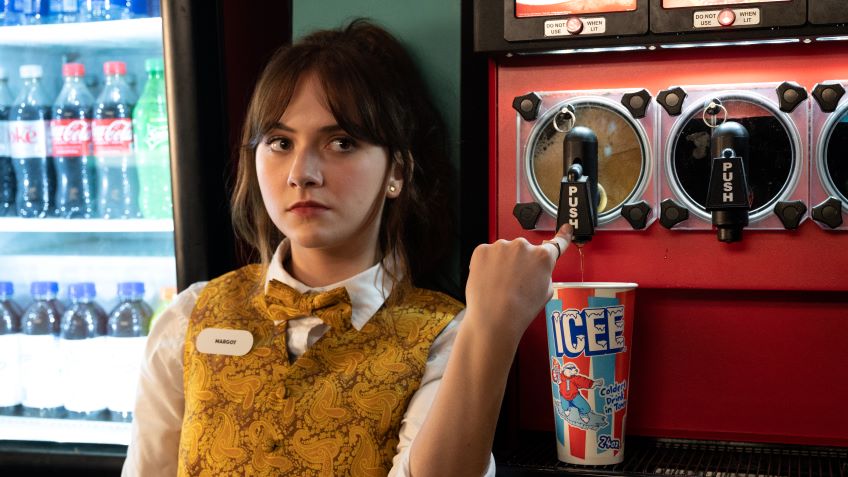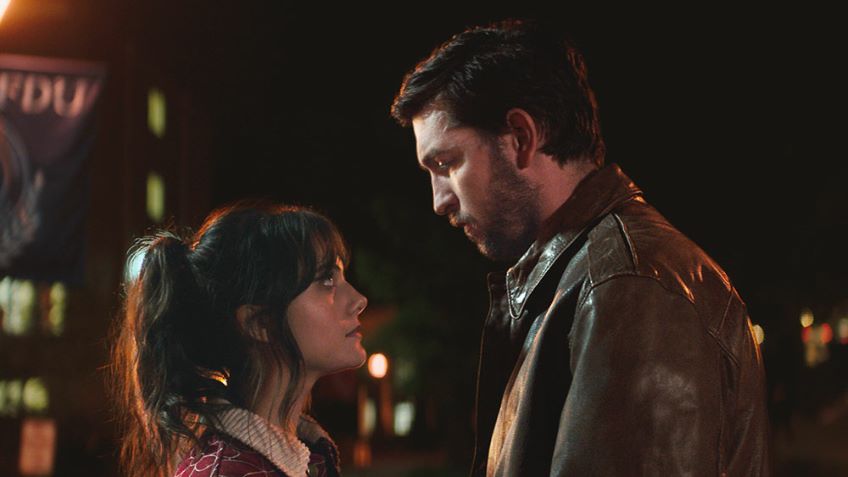Joyce Glasser reviews Cat Person (October 27, 2023) Cert 15, 118 mins.
That Susanna Fogel’s (The Spy Who Dumped Me) film holds our attention is down to the performances and awkward chemistry of Emilia Jones (without the soppy wholesomeness of CODA) and Nicholas Braun (TV’s Succession) and the zeitgeist of Kristen Roupenian’s short story in The New Yorker Magazine that went viral.
Michelle Ashford’s (Operation Mincemeat) script lifts much of the dialogue and details from Roupenian’s story but invents a few scenes and characters (cameos from Hope Davis and Isabella Rossellini), to pad out the very short story to nearly two hours. More positively, the filmmakers finds a cinematic way to turn the third person story into a more immersive first person film. But the biggest change is the ending which offers the hard-done-by would-be boyfriend, a reprieve. What puts a damper on the ending is that the heroine’s actions – and much else – defies credulity.
Margot, a 20-year-old college sophomore (Emilia Jones) meets a thirty something Robert (Nicholas Braun) at the concession stand of the cinema where she works. He buys popcorn and Red Vines (a red liquorice candy) and something more than boredom prompts Margot to comment about his uncommon selection. If he knows Margot is flirting, he does not let on which just makes Margot more interested in him. On a second visit to the cinema, after the film Robert approaches Margot and, while he knows her name, says, ‘concession-stand girl, give me your phone number.’ The blunt command of a Neanderthal man is oddly effective and Margot finds herself starting a relationship.

The film devotes ample time to a roommate, Taylor (Geraldine Viswanathan), a cynical, card-carrying member of the #MeToo movement who, while not hating men, is very wary of them. Trying to describe her new interest to Taylor, Margot says, ‘He looks like the best friend in a Judd Apatow movie,’ to which Taylor replies, ‘So, tall dark and problematic?’ Margot does not set out to prove Taylor wrong but wants her instincts to be right. Her last relationship with a student her age ended when he revealed that he had gone off women while exploring his sexual identity.
One day, after Margot texts Robert that she is starving, he stops by the lab where she is doing some work to deliver junk food provisions. It’s a romantic moment as Margo shows him around the lab munching on Doritos and Red Vines, but the evening ends in disaster and her feelings for Robert cool off. He redeems himself with a few texts, and when Margot goes home for half-term, her parents notice that she is texting non-stop. The texts grow more intimate and informative. Robert tells Margot he has two cats which she finds comforting. A statement she later recalls when she realises there was no trace of cats at his house. But for now, Margot half-jokingly tells her parents that she is in love and they will probably get married.
By the time Margot returns to university, she wants to take the relationship to the next level. What is both seductive and off-putting is that Robert is never demonstrative. He has not even kissed her or asked her on a date up until this point, and their first date creates misgivings. Robert suggest a movie that she has no desire to see and once there, Robert’s attention is clearly on the film and not her.

Again Robert redeems the situation by suggesting they go for a drink. But here again romance is thwarted when Margot is refused entry due to her age and bursts into tears of embarrassment. A sloppy kiss more like an attack than a show of affection is less of a turn off than she expects. Margot imagines with a kind of tenderness that Robert is simply inexperienced and will be impressed with her sexual prowess.
The crux of the story, and the film, is what happens when Margot accompanies Robert to his home, half fearing he will murder her on the way or when they are alone in his gloomy but substantial house. The protracted sex scene, so infamous from the story, is agonising here, too, and Fogel has Margot standing at the foot of the bed, communicating with her-self in bed with Robert during the entire bad sex act so we know exactly what is happening in her mind. Margot the onlooker tells Margot to get out and run, but she decides it is easier, and safer, to just grin and bear it and then create an excuse to dash home.
This is not a film about dating apps and online dating, but rather online relationships where messages take on a life of their own and the risk of misinterpreting the sender’s intentions is a big one. What hooked younger readers on the 2017 story was the frankness with which Roupenian describes the experience of bad sex on a date that goes sour – for the woman. Robert’s experience is completely different from Margot’s, as though he was not there with her, but on another planet.
What makes Margot’s disappointment more problematic, for Taylor is proven right, is that the texting foreplay promised so much while Robert is still convinced they are an item. Roupenian realised that we’ve all been there but no one talks about it. How do you react when there is no protocol? Women need to know they are not alone in facing the aftermath of bad sex.
The new ending gives the filmmakers a chance to delve deeper into the misreading of signals and personalities. Margot knows very little about Robert, and she fills the lacuna with her imagination fed by fear. Margot decides, rather unbelievably, to protect herself with a plan that defies credibility but is the only way the filmmakers could come up with to get her back to the house. What ensues takes up where the last chilling text message of The New Yorker story leaves off.
If Roupenian leaves us to ponder her shocking ending and create our own aftermath, Fogel and Ashford deny us this rumination, turning the film into a woman-in-jeopardy horror/thriller. But the controversial ending also has the effect of making Robert a more complex, misunderstood and tragic character, consistent with the theme of how our subjective projections, fuelled by insecurities and expectations, can make a bad date worse.




